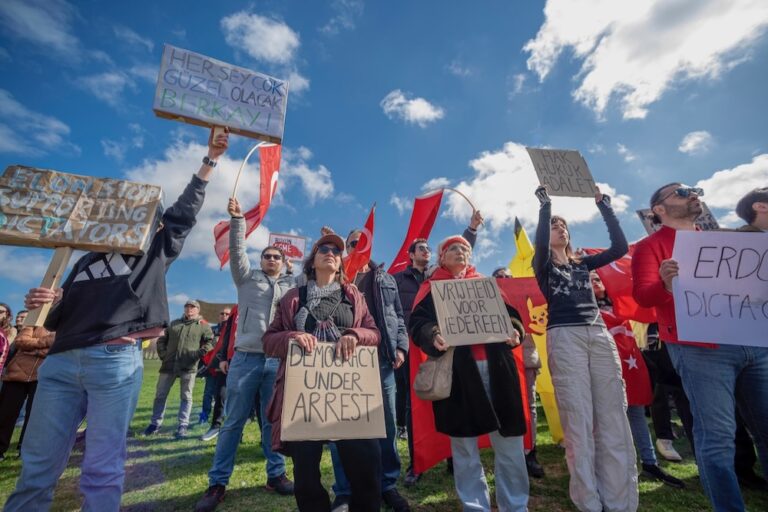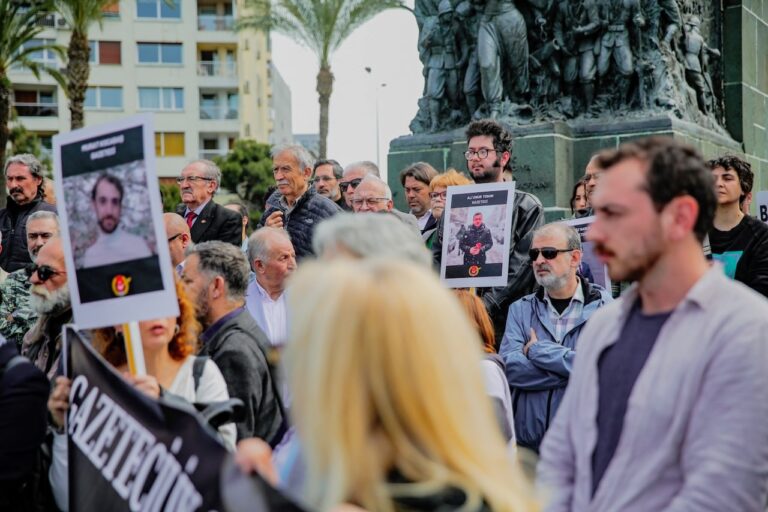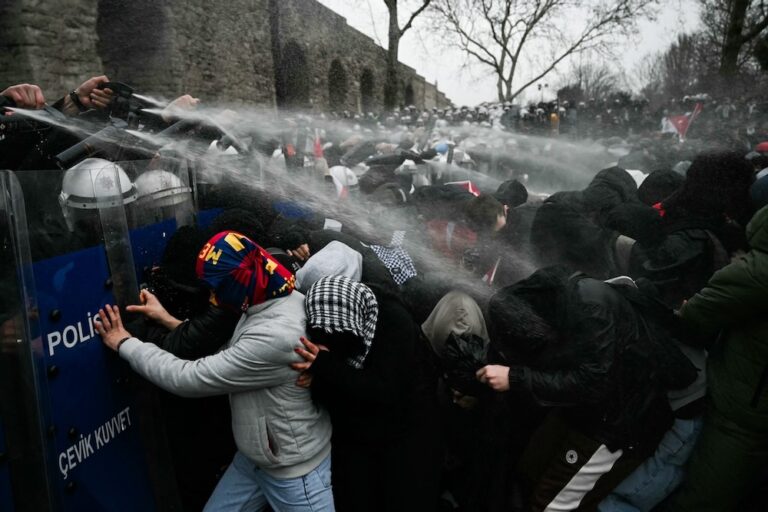(WiPC/IFEX) – The following is WiPC’s appeal in support of Turkish writer Mehmed Uzun: In February 2001, the Istanbul State Security Court brought charges against two of Mr. Uzun’s literary works, the collection of essays “Nar Cicekleri” (Pomegranate Flowers), and his latest novel, “Ask Gibi Aydinlik, Ölüm Gibi Karanlik” (Light as Love, Dark as Dearth). […]
(WiPC/IFEX) – The following is WiPC’s appeal in support of Turkish writer Mehmed Uzun:
In February 2001, the Istanbul State Security Court brought charges against two of Mr. Uzun’s literary works, the collection of essays “Nar Cicekleri” (Pomegranate Flowers), and his latest novel, “Ask Gibi Aydinlik, Ölüm Gibi Karanlik” (Light as Love, Dark as Dearth). The prosecutor demands that Mr. Uzun and his Turkish publisher, Hassan Öztroprak of Gendas Kültür Publishing house, be sentenced to the maximum penalty. According to experienced lawyers in Turkey, this is unique even for a country such as Turkey, where writers and intellectuals are constantly being prosecuted and convicted.
The trials will take place on 29 March and 4 April 2001, at 9:30 a.m. Mehmed Uzun has been summoned to appear before the court on 4 April, and has announced that he will go to Istanbul to appear before the paramilitary special court.
Several Scandinavian writers and intellectuals, as well as representatives of writers’ organizations and journalists from Scandinavia will be present, along with Turkish writers and intellectuals. International PEN will be represented by WIPC Chair Eugene Schoulgin.
We urge you to do everything in your power to support Mehmed Uzun and his publisher:
– by signing the appeal and returning it to the address below;
– by making your personal protest against the prosecutions known by way of letters to the responsible Turkish authorities (you will find fax numbers below), and by issuing a press statement;
– and, if possible, by attending the trial in Istanbul on 4 April.
On the eve of the trial, the appeal in support of Mehmed Uzun and his publisher is to be made public at a press conference in Istanbul in the presence of the Turkish PEN Centre, the Turkish Writers’ Assosiation and eminent Turkish writers.
Yours sincerely,
Eugene Schoulgin, Chair, WIPC, International PEN
Christian Salmon, Executive Director, The International Parliament of Writers
Bunny Ragnestam, Chair, The Swedish Writers Union
Karsten Alnæs, Chair, The Norwegian Writers Union
Jan-Erik Petterson, Publisher in Chief, Ordfront Publishing House, Sweden
Aase Gjerdrum, Publisher, Cappelens, Publishing House, Norway
Lucien Leitess, Publisher in Chief of Unionsverlag, Schweiz
William Nygaard, Publisher in Chief, Aschehoug Publishing House, Norway
Lars Grahn, Chair, The Swedish Editors Union
Gerhald Nagler, Chair, The Swedish Editors Union
Peter Curman, Chair of KLYS Helsinki Committee
Arne Ruth, professor, writer and journalist
Monica Nagler, Chair, Swedish PEN
Kjell Olaf Jensen, Chair, Norwegian PEN
Elisabeth Nordgren, Chair, Finnish PEN
Maria Ekman, translator
Kersin Ekman, writer
Birgitta Trotzig, writer
P.S. This appeal was delivered to Turkish authorities on March 25.
—
Appeal to protest the new turn in Turkey’s violations of the freedom of artistic expression
Barely a year ago, a large number of books in Turkish and Kurdish by the world-renowned author Mehmed Uzun were seized in bookshops around Turkey as a result of a decision passed by the Dyarbakir State Security Court. This flagrant violation of democratic rights resulted in a letter of protest signed by prominent authors and intellectuals from around the world, among them three Nobel Laureates.
Many of the signatories had been among those backing an open letter to the Turkish government supporting the rights of the Kurdish minority, published in October 1999. Eventually, the Dyarbakir decision was overturned by a superior court.
Now, once again, Mehmed Uzun’s work is threatened by Turkey’s judicial system. The prosecutor of the Istanbul State Security Court has indicted Uzun’s novel “Ask Gibi Aydinlik, Ölüm Gibi Karanlik” (Light as Love, Dark as Death) and his collection of essays “Nar Cicekleri” (Pomegranate Flowers) for “disseminating separatist propaganda” and “supporting a terrorist organisation”. His publisher, Hassan Öztroprak, in charge of Gendas Kültür Publishing House, has also been indicted. Both face up to 15 years in prison.
These books, accused of such crimes, have won international recognition for their poetic value, narrative and epic liveliness, and profound human attitudes. Uzun’s literary work in general is a peaceful defence of the little man’s dignity and his right to personal memories and culture.
In numerous speeches, in Turkey and abroad, Mehmed Uzun has openly declared himself against violence and the quenching of free speech. He has been criticized and threatened by militant groups among Kurds for his advocacy of mutual cultural and linguistic respect and co-existence among all individuals and peoples in the Turkish Republic.
The letter of protest against last year’s confiscation of Uzun’s books includes the following statement: “This seizure is an outrage against the principles of freedom of speech and freedom of the press. It is also a violation of the Kurdish minority’s rights to a language and a culture of their own, and accordingly, it shows how far Turkey has yet to go if she is to fulfill the appeals of the open letter. In such circumstances, it would be absurd to let Turkey win access to the European Union.”
The fact that the decision to seize Uzun’s books was overturned seemingly indicated that the Dyarbakir Court had misinterpreted Turkish law. The present indictment by a central Security Court shows that this is not the case. The problem rests not only with the attitudes of individual prosecutors, it emerges in the body of law now defining citizens’ rights in Turkey. This makes the measures now taken against Uzun and his publisher extremely serious. Both the laws and the judicial handling of the matter are in conflict with all international definitions of human rights to which Turkey has declared its adherence, including the European Human Rights Convention and the United Nations Convention on Civil and Political Rights.
Uzun is deeply rooted in the world of literature. By persecuting an author of such moral and aesthetic stature, the judicial system of Turkey enters the category of repression which affected writers such as Yuli Daniel, Andrei Sinyavsky and Joseph Brodsky.
We, the signatories of this appeal, condemn the opening of the trial against Mehmed Uzun and his publisher, Hassan Öztroprak. We now reiterate the argument made in regard to last year’s seizure of books, with the added observation that Turkish law must be revised into a definition in full accordance with international law. Until this change is made, Turkey cannot be accepted as an equal partner in relations with democracies. A first step in showing that this process is underway will be to drop all charges against Mehmed Uzun and his publisher Hassan Öztroprak.
Recommended Action
Send similar appeals to the authorities.
Appeals To
Ahmet Necdet Sezer
President
Fax: + 90 312 427 13 30
Bülent Ecevit
Prime Minister
Fax: + 90 312 417 57 43
Ismail Cem
Minister of Foreign Affairs
Fax: + 90 312 287 88 11
Hikmet Sami Türk
Minister of Justice
Fax: + 90 312 417 38 54
Please copy appeals to: jan@ordfront.se and WiPC.
Contact persons: Jan-Erik Petterson or Eva Stenberg, Ordfront Publishing House, tel: + 46 8 462 44 28, fax: + 46 8 462 44 90


